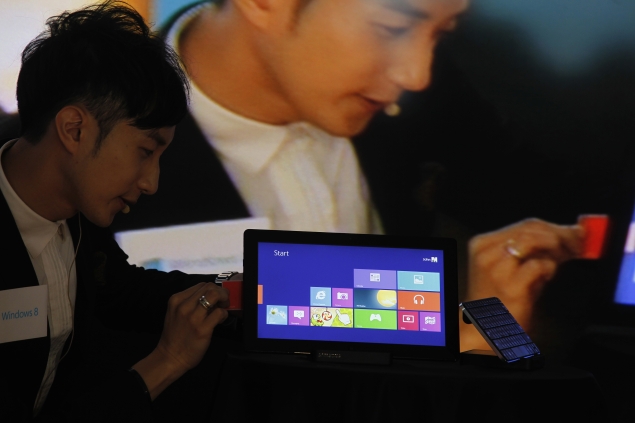- Home
- Tablets
- Tablets News
- Microsoft's profit margin on Surface higher than Apple's iPad
Microsoft's profit margin on Surface higher than Apple's iPad

Microsoft Corp.'s first self-made tablet, the Surface, costs about $267 in parts and labor when excluding its optional keyboard cover. It went on sale Oct. 26 priced at $499, for a profit margin of around 46 percent. Surface comes with a 10.6-inch screen measured diagonally, and can access the Internet only through Wi-Fi. The price is for its base model with 32 gigabytes of memory.
With a similar configuration, the Surface bakes in slightly more profit for Microsoft than Apple Inc. did when it released its third-generation iPad in March.
Apple's third-generation Wi-Fi-only iPad with 32GB of memory and a 9.7-inch screen cost an estimated $333 and retailed for $599, for a 44 percent profit margin. The 16GB base model cost $316 and was priced at $499, for a profit margin of 37 percent.
A preliminary analysis of the fourth-generation iPad, which comes with a faster processor and went on sale Friday, costs about $305 in parts and labor for the 32GB Wi-Fi-only model, for a 49 percent margin, estimates IHS analyst Andrew Rassweiler. The 16GB base model costs about $295 and sells for $499, he says.
IHS' analysis excludes costs for marketing, sales or operating system-software, which Microsoft has been touting with its device. The research firm obtains the devices independently and breaks them apart to estimate the cost of the components.
The analysis suggests Microsoft is imputing a cost for its latest operating system, the slimmed-down Windows RT, which debuted last month. It also needs to price its flagship tablet high enough so that manufacturing partners like Dell and Lenovo can compete even after paying Microsoft for the operating system.
Apple is maintaining premium pricing as the market leader.
Among smaller-sized tablets, the iPad Mini that went on sale on Friday boasts a 7.9-inch screen measured diagonally and costs $198 for parts and labor. This 16GB model has a retail price tag of $329, for a profit margin of 40 percent.
The 7-inch offering from Google Inc., the Nexus 7, costs $159 for its 8GB model and sells for $199, according to IHS. That's a profit margin of 20 percent. Google makes a little more on its 16GB model, which costs about $167 to make but sells for $249, for a 33 percent margin.
Amazon.com Inc. spends about $174 to make its 7-inch Kindle Fire HD with 16GB of memory and sells it for $199, for a profit margin of 13 percent. That's better than the original Kindle Fire, a money-loser that, on launch, cost Amazon about $202 for every $199 it collected on a sale.
Google is aiming to both make a profit and broaden the reach of its Android operating system, while Amazon is looking to make up the profit gap when customers buy movies, books and magazines from its store.
"Amazon and Google want to put tablets in consumers' hands even if it means doing so at a minimal hardware profit," Rassweiler said in a statement.
Microsoft Surface in pictures
Get your daily dose of tech news, reviews, and insights, in under 80 characters on Gadgets 360 Turbo. Connect with fellow tech lovers on our Forum. Follow us on X, Facebook, WhatsApp, Threads and Google News for instant updates. Catch all the action on our YouTube channel.
Related Stories
- Samsung Galaxy Unpacked 2026
- iPhone 17 Pro Max
- ChatGPT
- iOS 26
- Laptop Under 50000
- Smartwatch Under 10000
- Apple Vision Pro
- Oneplus 12
- OnePlus Nord CE 3 Lite 5G
- iPhone 13
- Xiaomi 14 Pro
- Oppo Find N3
- Tecno Spark Go (2023)
- Realme V30
- Best Phones Under 25000
- Samsung Galaxy S24 Series
- Cryptocurrency
- iQoo 12
- Samsung Galaxy S24 Ultra
- Giottus
- Samsung Galaxy Z Flip 5
- Apple 'Scary Fast'
- Housefull 5
- GoPro Hero 12 Black Review
- Invincible Season 2
- JioGlass
- HD Ready TV
- Latest Mobile Phones
- Compare Phones
- Tecno Pova Curve 2 5G
- Lava Yuva Star 3
- Honor X6d
- OPPO K14x 5G
- Samsung Galaxy F70e 5G
- iQOO 15 Ultra
- OPPO A6v 5G
- OPPO A6i+ 5G
- Asus Vivobook 16 (M1605NAQ)
- Asus Vivobook 15 (2026)
- Brave Ark 2-in-1
- Black Shark Gaming Tablet
- boAt Chrome Iris
- HMD Watch P1
- Haier H5E Series
- Acerpure Nitro Z Series 100-inch QLED TV
- Asus ROG Ally
- Nintendo Switch Lite
- Haier 1.6 Ton 5 Star Inverter Split AC (HSU19G-MZAID5BN-INV)
- Haier 1.6 Ton 5 Star Inverter Split AC (HSU19G-MZAIM5BN-INV)







![[Partner Content] OPPO Reno15 Series: AI Portrait Camera, Popout and First Compact Reno](https://www.gadgets360.com/static/mobile/images/spacer.png)









